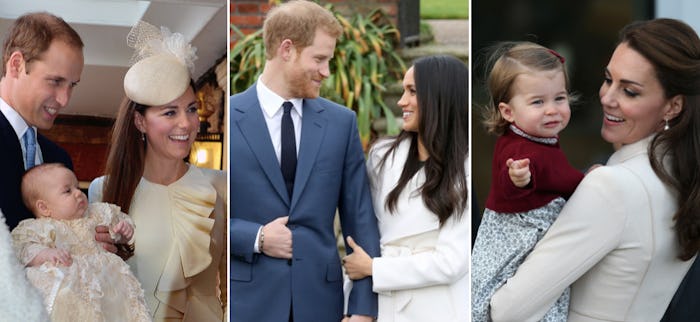Entertainment

5 Royal Baby Name Rules & Traditions That May Inspire Prince Harry & Meghan Markle
It goes without saying that there are a lot of royal rules and traditions out there, and that's especially true for royal baby names. It's probably unacceptable for a member of the royal family to choose a baby name at random, for instance, or to go for something completely unique. But wait — those are just a few examples. Here are five royal baby name rules and traditions that the royals supposedly follow.
Before Prince Louis made his debut in April, there was a lot of talk about what his name would be. The same phenomenon is playing out again with Meghan Markle and Prince Harry's baby-to-be, who is due very, very soon, presumably sometime in late April or early May. In fact, there are loads bets on the little one's name, and some popular guesses include, according to Business Insider: Alexander, Alice, Victoria, and James.
As you might have noticed, the aforementioned names are pretty traditional. And if you've followed the royal family closely throughout the years, you probably already know that are a few rules that ensure royal baby names don't stray too far from the norm. Tradition reigns supreme in the royal family, after all.
So, what are some baby naming traditions the royal family sticks to? Some might surprise you.
1Traditional, Yet Accessible
Although the royal family seems to always opt for traditional monikers, they also want the name to be accessible. Translation: They want a name that is modern and timely, but not too modern.
"The key consideration when naming a royal baby is the fine balance between tradition and accessibility," Christian Turner, a global naming director at Siegel+Gale, said about Prince William and Kate Middleton's naming of Prince Louis, according to The Mirror. "The Duke and Duchess of Cambridge will want the fifth-in-line to the throne to bear a name worthy of such weight, and it's therefore likely they will choose a solid, traditional name with strong links to royalty.
He added in the same interview with The Mirror, "At the same time, they won't want to appear old-fashioned or haughty, so choosing a name the public can embrace is equally important."
2The Queen Must Approve
It's really no surprise that the Queen of England has some say in her great-grandkids' names. Although the Queen doesn't actually choose the names, she does get to give her opinion before a moniker is announced, according to The Independent. It's important to note, however, that the Queen isn't imposing her will on anyone either.
"The Queen has the power to say what their title is - she'll decree that they are the Prince of Cambridge," royal commentator Kate Williams explained to CNN. "But in the case of names, it is more of an informal conversation.”
3Every Name Needs A Pinch Of History
The Duke and Duchess of Sussex will probably choose a name that has significance to a late member of the royal family. Prince George’s name, George Alexander Louis, for example, pays homage to Queen Elizabeth’s father, King George VI, according to Good Housekeeping.
Charlotte Elizabeth Diana, the couple's second child, incorporates the Queen's name and the moniker of her paternal grandmother, late Princess Diana.
These choices show that a historic name doesn't have to be stuffy — both Prince George and Princess Charlotte's monikers are sentimental and sweet.
4The Line Of Succession Plays A Role
In a not-so-surprising twist, where a royal stands in the line succession of can play role their chosen name.
"The further down the line of succession, the more likely you are to have a more unique or untraditional name," Carolyn Harris, a professor of history at the University of Toronto School of Continuing Studies and author of Raising Royalty: 1,000 Years of Royal Parenting, told Vogue Australia.
Translation: You're probably not going to see a future king named Axel or River anytime soon. Not that there's anything wrong with those names, of course.
5The Name Must Have An Official Title
Although the royals don't have official last names, their monikers must include their official title, including the location of their peerage (aka rank). Princess Charlotte, for instance, is "Princess Charlotte of Cambridge."
As for Markle and Prince Harry's kids, each of them will have "Sussex" attached to their name. Pretty fancy, huh?
Naming a royal, as evidenced by these supposed rules, can be a bit tough. But it also seems like a beautiful process — from the history to the elements of tradition, there's a lot to admire.